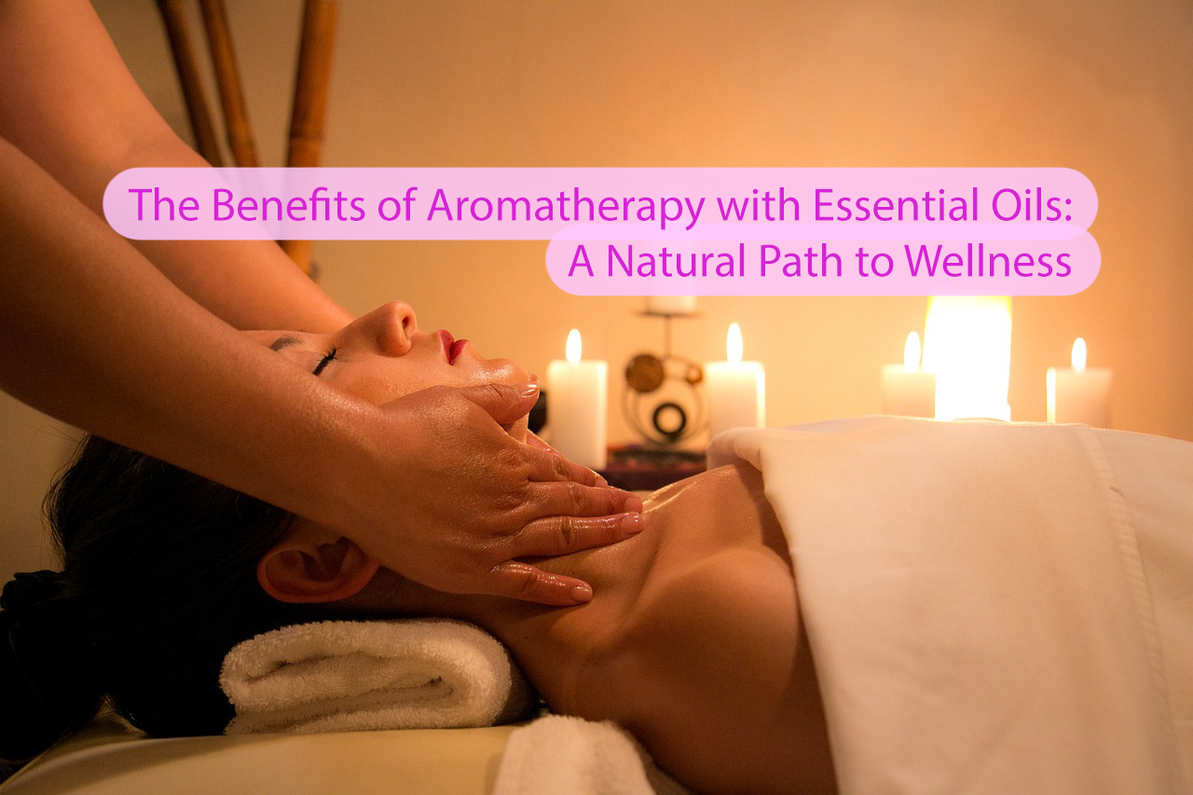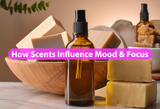The Benefits of Aromatherapy with Essential Oils: A Natural Path to Wellness
Aromatherapy is a centuries-old practice that uses the power of natural plant extracts, known as essential oils, to improve physical, emotional, and mental well-being. Through the use of various essential oils, this holistic approach can enhance relaxation, boost mood, reduce stress, and even promote better sleep. But what makes aromatherapy so effective, and how can you incorporate it into your daily routine? In this blog, we’ll dive into the key benefits of aromatherapy with essential oils and how you can use them to improve your overall wellness.
What is Aromatherapy?
Aromatherapy is the therapeutic use of plant-derived essential oils, typically extracted from flowers, leaves, peels, bark, or roots of plants, as an aid to improve mental and physical health. The oils are often inhaled through a diffuser or absorbed through the skin during a massage or in bath products. When diffused, the aromas are believed to trigger responses in the brain’s limbic system, which controls emotions, mood, and even memory.
Key Benefits of Aromatherapy with Essential Oils
1. Reduces Stress and Anxiety
One of the most well-known benefits of aromatherapy is its ability to help reduce stress and anxiety. Essential oils such as Lavender, Chamomile, and Ylang Ylang are known for their calming and relaxing properties. When inhaled or applied topically, they can help promote a sense of calm, reduce feelings of anxiety, and encourage relaxation.
- Lavender: Widely regarded as one of the most soothing essential oils, Lavender has been shown to help lower cortisol levels (the stress hormone) and create a feeling of peace and tranquility.
- Chamomile: This gentle oil is perfect for relaxing the nervous system and promoting restfulness.
- Ylang Ylang: With its sweet, floral aroma, Ylang Ylang helps ease feelings of tension and boosts mood.
2. Enhances Sleep Quality
Struggling with sleep issues? Aromatherapy can help. Essential oils such as Lavender, Cedarwood, and Sandalwood have sleep-enhancing properties that may help you unwind and prepare for a restful night.
- Lavender: Its calming effects on the nervous system can help you relax and fall asleep faster.
- Cedarwood: Known for its grounding aroma, Cedarwood helps create a calming atmosphere perfect for promoting deeper, more restorative sleep.
- Sandalwood: This warm, woodsy scent encourages a peaceful environment, ideal for inducing a tranquil state before bed.
3. Boosts Mood and Mental Clarity
Essential oils are known to have an uplifting effect on mood and mental clarity. Oils such as Lemon, Peppermint, Bergamot, Rosemary, and Lemon Myrtle can help promote focus, mental alertness, and emotional well-being.
- Lemon: A popular energising oil, Lemon is known for its ability to boost energy levels and improve focus and concentration.
- Peppermint: This invigorating oil can help reduce mental fatigue and promote mental clarity, making it ideal for moments when you need a mental pick-me-up.
- Bergamot: With its citrusy, fresh aroma, Bergamot is often used to alleviate feelings of sadness, lift mood, and support emotional balance.
- Rosemary: Rosemary oil helps improve concentration, boost memory, and reduce mental fatigue, making it an excellent oil for promoting mental clarity.
- Lemon Myrtle: Known for its refreshing, citrus-like scent, Lemon Myrtle can uplift your spirits, sharpen focus, and enhance alertness.
4. Supports Immune System Health
Certain essential oils have immune-boosting properties, which can help support the body’s natural defence system. Eucalyptus and Tea Tree are commonly used in aromatherapy to help cleanse the air, prevent infections, and encourage respiratory health.
- Eucalyptus: Often used in diffusers to clear the airways, Eucalyptus helps support respiratory health by promoting clear breathing and providing relief from congestion.
- Tea Tree: Known for its purifying properties, Tea Tree oil is a powerful antimicorbial that helps combat viruses and bacteria, particularly when used to wipe down surfaces during the cold and flu season.
5. Relieves Headaches and Migraines
Aromatherapy can be a natural solution to help relieve headaches and migraines. Essential oils such as Peppermint, Lavender, and Rosemary are commonly used to reduce the intensity of headaches and ease associated tension.
- Peppermint: The cooling effect of Peppermint oil can help alleviate headache pain and reduce tension in the head, neck, and shoulders.
- Lavender: This soothing oil is known to relax the body and relieve headache symptoms, particularly when combined with a calming environment.
- Rosemary: Rosemary oil has been shown to increase circulation and provide relief from stress-induced headaches and tension.
6. Improves Skin Health
Aromatherapy is also beneficial for improving skin health. Essential oils such as Tea Tree, Geranium, Frankincense, Carrot Seed, and Rosewood are often used in skincare routines due to their antibacterial, anti-inflammatory, and regenerative properties.
- Tea Tree: Well-known for its antibacterial properties, Tea Tree oil is a powerful oil for cleansing and healing the skin. It can help treat acne, blemishes, and other skin conditions.
- Geranium: Geranium oil helps balance oil production in the skin, making it suitable for both dry and oily skin types. It also has anti-aging properties that promote skin rejuvenation.
- Frankincense: Known for its rejuvenating qualities, Frankincense is often used to reduce the appearance of fine lines and wrinkles, making it ideal for aging skin.
- Carrot Seed: Carrot Seed oil is excellent for skin regeneration. It's known for its ability to support skin tone and texture and is often used to treat dry or aging skin. Its nourishing properties make it a popular choice for rejuvenating skin cells and promoting a youthful appearance.
- Rosewood: Rosewood oil has a calming effect on the skin and can help restore moisture, making it ideal for dry or irritated skin.
How to Use Essential Oils for Aromatherapy
There are several ways to incorporate essential oils into your daily routine for aromatherapy:
- Diffusion: Use an essential oil diffuser to disperse the fragrance throughout your home. This is one of the easiest ways to benefit from aromatherapy.
- Topical Application: Apply essential oils diluted with a carrier oil to your skin for targeted relief. Popular areas include the temples, neck, wrists, or the bottom of your feet.
- Inhalation: Place a few drops of essential oil on a cotton ball or tissue and inhale deeply, or add a few drops to a bowl of hot water and inhale the steam.
- Bath: Add a few drops of essential oil to a warm bath to create a calming, soothing experience.
Conclusion
Aromatherapy with essential oils is a natural and effective aid to support your physical and emotional well-being. Whether you’re looking to relax, improve your mood, sleep better, or boost your immune system, there’s an essential oil that can help. By incorporating essential oils like Lavender, Peppermint, or Eucalyptus into your routine, you can enjoy the powerful benefits of aromatherapy every day.
Recent Posts
-
Diffusing the Spirit of Easter: Uplifting Autumn Aromas & Herbal Rituals for Southern Homes
For much of the world, Easter arrives wrapped in blossoms, sunshine, and the scent of fresh spring a …3rd Mar 2026 -
Anti-Inflammatory Herbs You Can Add to Your Tea
Inflammation is a natural and essential part of the body’s defence system. In the short term, it hel …17th Feb 2026 -
How Scents Influence Mood & Focus
Scent is one of the most powerful and often overlooked tools in wellbeing. Long before we consciousl …21st Jan 2026




